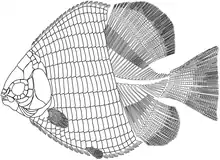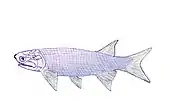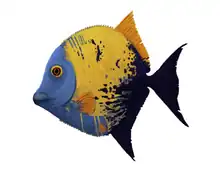| Hemicalypterus Temporal range: Late Triassic, ~ | |
|---|---|
 | |
| Skeletal reconstruction | |
| Scientific classification | |
| Domain: | Eukaryota |
| Kingdom: | Animalia |
| Phylum: | Chordata |
| Class: | Actinopterygii |
| Order: | †Dapediiformes |
| Family: | †Dapediidae |
| Genus: | †Hemicalypterus Schaeffer, 1967 |
| Species: | †H. weiri |
| Binomial name | |
| †Hemicalypterus weiri Schaeffer, 1967 | |
Hemicalypterus is an extinct genus of prehistoric ray-finned fish that lived during the late Triassic period (approx. 221.4 to 205.6 Ma). It contains a single species, Hemicalypterus weiri. Fossils have been collected in the southwestern United States, including Utah and New Mexico.[1] Hemicalypterus belonged to the family Dapediidae, and like other members of its family, it was a deep-bodied fish with a covering of thick ganoid scales. It differed from other dapediids in lacking scales on the posterior part of the body, and in possessing unusual, multicuspid teeth. These teeth were similar to those of modern-day herbivorous fish, which indicates that Hemicalypterus may have been a herbivore as well.[2]
See also
References
- ↑ "Hemicalypterus Schaeffer 1967 (ray-finned fish)". fossilworks. Retrieved 23 August 2015.
- ↑ Sarah Z. Gibson (2016). "Redescription and Phylogenetic Placement of †Hemicalypterus weiri Schaeffer, 1967 (Actinopterygii, Neopterygii) from the Triassic Chinle Formation, Southwestern United States: New Insights into Morphology, Ecological Niche, and Phylogeny". PLOS ONE. 11 (9): e0163657. Bibcode:2016PLoSO..1163657G. doi:10.1371/journal.pone.0163657. PMC 5033578. PMID 27657923.
External links
This article is issued from Wikipedia. The text is licensed under Creative Commons - Attribution - Sharealike. Additional terms may apply for the media files.




